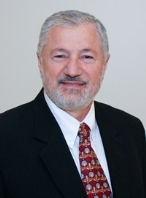
Ramzi Mohammad, Ph.D., professor of Oncology for the Wayne State University School of Medicine and the Barbara Ann Karmanos Cancer Center, and Asfar Azmi, Ph.D., research scientist in the WSU Pathology Department, have contributed the cover design of the February edition of Gastroenterology.
The pair, along with their co-authors, also has an article in the print publication, titled, "Selective Inhibitors of Nuclear Export Block Pancreatic Cancer Cell Proliferation and Reduce Tumor Growth in Mice."
The cover image is a visual illustration of the team's research into the role that tumor suppressor proteins, or TSPs, play in preventing the growth of pancreatic cancer cells, as well as the identification of a cellular protein, Exportin-1, or XPO-1 or CRM-1, which inhibits certain tumor suppressor functions. CRM-1 is over-expressed in pancreatic cancer, making it an attractive therapeutic target. CRM-1 shuttles tumor suppressor proteins out of the nucleus of the cell and into the cytoplasm that surrounds the nucleus. Those suppressor proteins work only when they are inside the nucleus, so CRM-1 actions make the tumor-killing drugs less effective and allow tumors to continue growing.
The authors, in collaboration with Karyopharm Therapeutics of Boston, have developed selective inhibitors of nuclear export that bind to CRM-1 and block the export of TSPs, resulting in tumor shrinkage of pancreas tumors in mice. Targeting CRM-1 forces the tumor suppressor proteins to function properly and induce cancer-specific cell death.
Researchers note that treatment of pancreatic cancer is an unmet clinical problem with annual deaths that exceed breast and prostate cancers, due to the lack of effective drug therapies.
The research team, in collaboration with Philip Philip, M.D., Ph.D., F.R.C.P., professor of Internal Medicine and leader of the Gastrointestinal and Neuroendocrine Oncology Multidisciplinary Team at WSU and Karmanos, and Anthony Shields, M.D., Ph.D., professor of Internal Medicine and Oncology, and associate center director of Clinical Sciences at Karmanos and WSU, are initiating gastrointestinal clinical trials using this novel inhibitor starting in February.